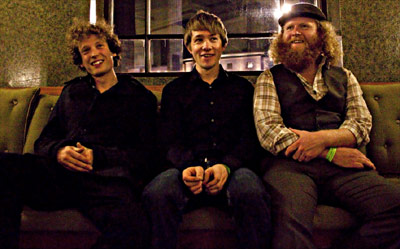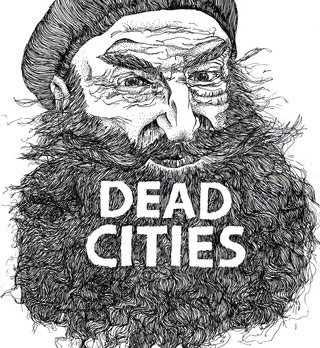
| HOME |
| NERVE |
| REVIEWS |
| ARCHIVE |
| EVENTS |
| LINKS |
| ABOUT US |
| CONTRIBUTORS |
| BACK ISSUES |
| CONTACT US |
The Rise of Dead Cities: Dead Cities Interview
Fresh from playing St. George’s Hall late last year and a headline slot at the Family Folk Up gig at the Scandinavian Church, Dead Cities are possibly the nearest Liverpool has to the likes of The Band and Eliot Smith. Additionally influenced by nu-folk, US punk, and George Orwell, their dystopian lyrics prove initial appearances can be deceiving, however. Nerve met up with them for an interview.
 By
Richard Lewis
– 18/02/2011
By
Richard Lewis
– 18/02/2011
A trio comprising Martin Stillwell, guitar/vocals, Ryan Wyatt, bass guitar, and Oli Hughes, drums, Dead Cities have seen their profile slowly snowball over the past twelve months. Avoiding standard rock rhythms, many of their songs canter along in folky 12/8 time, led by Martin’s plaintive vocals and an assortment of acoustic instruments. With Martin the only fixed point onstage sometimes the band swap instruments mid-song, utilizing mandolins, ukuleles, and glockenspiels to weave their intricate slow-burning melodies.
Martin states on the origins of the band’s sound, “I think we have tried to make our sound as un-regional as possible. Whether we've succeeded is another matter.” Citing The Band and Neil Young as key influences, the band operate in the same rustic-Americana territory, albeit suffused with their own identity as Martin’s unaffected Northern vocals testify. “I've loved Scouse sounding bands over the years but we don't need another one just now. We listen to a lot of different stuff in the band, Ryan and Oli are huge Zeppelin fans. We're all pretty smitten with Neil Young. I think North American music has been more ambitious than British in recent years. Of course, that's a massive generalisation”, he cautions. Oddball American nu-folk doyen Jeffrey Lewis is also a big source of inspiration. “There was a big Jeffrey Lewis phase a while back”, Martin says, “It's more his stage set-up and sound that influenced us. He has a completely different way of writing songs to us.” Vocally, Martin cites 1970s proto-punk Jonathan Richman as an influence. “Oli and I have been into Jonathan Richman and The Modern Lovers for a while now. He's got loads of vulnerability in his voice.”
 The daily
grind of modern life provides plenty of material for the band’s
lyrics; Saddest Star captures the frustration/disappointment of CV/Interview
scenarios perfectly; the rubble of post-war housing that inspired the
band’s name is referenced in the track of the same title. “Dead
Cities was taken from the name of one of our early songs, which is kind
of a break up song”, Martin explains, “The idea that everything
is desolate and there's rubble everywhere. Quite strange really because
that's what it looks like near where I live, they've demolished loads
of terrace houses on the way into Liverpool. I drive past it every time
on my way to band practice.” The Kissing Gate meanwhile, starts
out like a small-hours re-recording of a Phil Spector classic, the spare
instrumentation allowing Martin’s melancholy vocals plenty of room
to emote.
The daily
grind of modern life provides plenty of material for the band’s
lyrics; Saddest Star captures the frustration/disappointment of CV/Interview
scenarios perfectly; the rubble of post-war housing that inspired the
band’s name is referenced in the track of the same title. “Dead
Cities was taken from the name of one of our early songs, which is kind
of a break up song”, Martin explains, “The idea that everything
is desolate and there's rubble everywhere. Quite strange really because
that's what it looks like near where I live, they've demolished loads
of terrace houses on the way into Liverpool. I drive past it every time
on my way to band practice.” The Kissing Gate meanwhile, starts
out like a small-hours re-recording of a Phil Spector classic, the spare
instrumentation allowing Martin’s melancholy vocals plenty of room
to emote.
Asked what local bands he is fond of Martin responds, “I hear a lot of good music in Liverpool, but nothing has grabbed me for a while. Loads of friends are in excellent bands but there are too many to mention. In terms of music from last year, I enjoyed the most recent LCD SoundSystem album and I completely overplayed the Wild Beasts album. Recently I've been hammering a Roy Orbison Best Of in my car. What a singer. I go through phases of only listening to brand new music and then I go way, way back. I'm delving into the past presently.”
“I read a fair bit I suppose,” Martin replies when asked what non-musical influences fire his imagination. “I've read a lot of Douglas Coupland and Graham Greene books. It's not a conscious thing to be influenced by any writers, but maybe it happens anyway”, he says. “I'm far more concerned with melody and the way words sound than anything else. That's not to say I don't care about lyrics though, because I do.” The dislocated characters that occur in many of the songs would certainly seem at home in Coupland’s Generation X, their isolated Californian existence the flipside of the grim post-war realities of George Orwell, another inspiration.
In keeping with their name, Dead Cities’ logo is suitably dystopian. “The eyeball over the city is one of mine, drawn on my housemate’s laptop”, Ryan explains. “We had just decided on the name and I just drew something that sprung to mind. I think I thought of a dead city and with 1984 being my favourite book, it has a ‘Big Brother’ theme”. Like many other bands in Liverpool at the present time, Dead Cities’ artwork, including gig posters and sleeve designs, are an integral aspect of the band’s aesthetic. “I think artwork is important to any band.” Martin states. “It helps build your own little world. We've been using the same images for a while now. Partly because we didn't have any good press photos!”
The giddy waltz of Old Man, recalling mid-nineties R.E.M, accidentally chimed in with their gig posters. The highly distinctive image, a black and white line drawing of an old man with a huge beard (pictured) was created by designer Amée Christian independently of the group. “With the logo, I asked designer Amée if she would draw a picture for Dead Cities and she got back within two hours with this amazing old man's face with Dead Cities written in his beard”, Ryan explains. “We now use that as our main artwork and when it comes to the releases we will be getting her to do all the artwork for us, she’s a massive talent who I think we all buzz off.” The inspiration for the image however, remains a mystery. “Where she got the idea from I haven't a clue!” Ryan says. “At the time we were working on the song Old Man, which fitted quite well. I can’t wait to see what else she can do for us.”
As a three-piece, the group have resisted the temptation to recruit a fourth member, preferring to trade roles between themselves. “As there are only three of us we tend to swap around a bit to get different sounds, but I wouldn't say it's a major feature of the band”, Martin explains. “There is a bit of multitasking going on more for necessity than anything else. Oli does a bit of guitar and plays drums with his feet sometimes. We thought about getting a fourth member but we've developed a good understanding and it keeps it simple. Simplicity is important to us.”
http://deadcities.bandcamp.com
http://deadcitiesband.wordpress.com